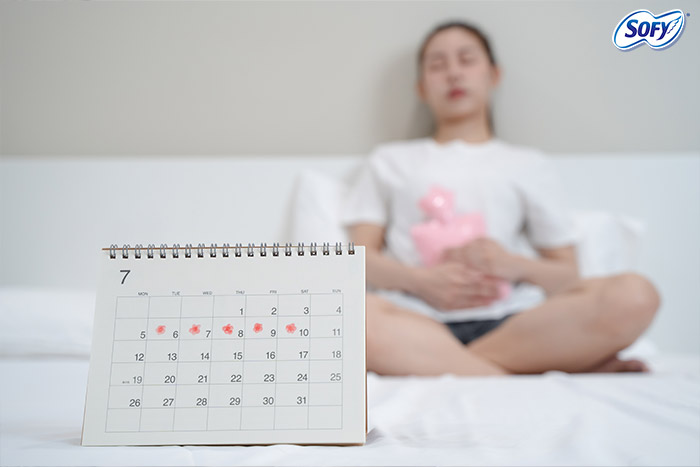If your period’s decided to ghost you this month, you’re not alone. It happens to the best of us. And no, it doesn’t always mean you’re pregnant. There are a ton of reasons why your period might not have come. Before you panic-text your BFF or start Googling your way into a medical mystery, take a deep breath. A late (or missing) period doesn’t always mean something’s wrong.
Let’s break it down, myth-bust some common fears, and figure out what to do without losing your mind.
1. First Things First: Don’t Panic
Late periods happen. Your period doesn’t have to tick-tock perfectly every month. Stress, travel, a weird sleep schedule, or even just being super busy can throw things off. Like, your uterus is not out to get you.
Even things like over-exercising, sudden weight changes, or switching up your birth control can delay your period. So if it’s just been a few days, try not to overthink it.
2. Start Tracking Your Periods
If you’ve ever said “My periods are all over the place”, or “I never know when it’s coming”, then this one’s for you. The best way to understand your body’s little quirks is to track your cycle. This doesn’t have to be a whole spreadsheet moment download the SOFY Club App (yes, it’s free and hella yes, it’s super easy to use)
Start logging when your period starts, ends, how heavy the flow is, or if you’re getting cramps, etc.
The more consistent you are with tracking, the more you’ll notice patterns—and trust us, your future self will thank you when you realize that your mood swings are not random but probably just PMS.
3. Look for PMS Symptoms
If you experience cramping, sore boobs, acne outbursts, mood swings, your body might still be trying to have a period, even if it’s taking its sweet time. If you’re feeling all the usual PMS drama, your period’s probably just fashionably late.
4. Use the Right Products (Even When You’re Not Bleeding)
Just because your period’s being mysterious doesn’t mean your body isn’t doing something. If you’re experiencing discharge or just wanna feel fresh, SOFY Pantyliners are your bFFs. They’re super thin, comfy, and perfect for those in-between days.
And when your periods do decide to show up (unannounced as usual), you’ve got options!
- SOFY AntiBacteria Pads are awesome for keeping your skin dry and hygienic.
- SOFY Bodyfit Pads are perfect for those heavy flow days.
- Prefer tampons? Try SOFY Tampons for that no-usage feeling. Seriously, it’s like they’re not even there.
5. When to Call a Doctor?
If your period’s gone AWOL for more than 2-3 months and you’re not pregnant, it’s time to check in with a doctor. No need to stress or self-diagnose; a simple ultrasound and blood test can rule out stuff like PCOS, thyroid issues, or iron deficiency anemia. If there’s a deficiency, your doctor might recommend supplements to help balance things out.
Final Words
Irregular periods don’t mean you’re doing anything wrong. Your body is talking to you—it’s just doing it in its own language. By tracking your cycle with the SOFY Club App, using products that support your needs, and checking in with a doc when needed, you’re already on the right track.
FAQ’s
2. Can stress cause a missed period?
Yes, stress can impact your menstrual cycle. High levels of stress can lead to hormonal imbalances, affecting the regularity of your period. Managing stress through relaxation techniques, exercise, and adequate sleep can help maintain a regular cycle.
3. How does exercise influence my period?
Both excessive and insufficient exercise can disrupt your menstrual cycle. Intense physical activity can lead to hormonal changes that may delay or stop periods, a condition known as hypothalamic amenorrhea. It's important to balance exercise with proper nutrition and rest.
4. Could my diet be affecting my period?
Yes, significant changes in your diet, especially drastic weight loss or inadequate nutrition, can lead to missed periods. Maintaining a balanced diet rich in essential nutrients supports hormonal health and regular menstruation.
5. Is it normal to miss a period occasionally?
Occasional missed periods can be normal, especially during times of stress, illness, or significant lifestyle changes. However, if you miss several periods in a row, it's advisable to seek medical advice to rule out underlying health issues.
6. When should I see a doctor about a missed period?
If you've missed three or more periods consecutively and you're not pregnant, it's important to consult a healthcare provider. Conditions like polycystic ovary syndrome (PCOS), thyroid disorders, or hormonal imbalances can cause irregular periods.
7. Can birth control affect my period?
Yes, hormonal contraceptives can alter your menstrual cycle. Some methods may cause periods to become lighter, less frequent, or stop altogether. If you're concerned about changes in your cycle due to birth control, discuss alternative options with your doctor.
8. What is secondary amenorrhea?
Secondary amenorrhea refers to the absence of periods for three months or more in someone who previously had regular cycles. Potential causes include stress, significant weight changes, excessive exercise, or underlying medical conditions.
9. Could a missed period indicate pregnancy?
A missed period is one of the earliest signs of pregnancy. If you're sexually active and your period is late, consider taking a home pregnancy test. For more accurate results, take the test after a week of the missed period.
10. How can I track my menstrual cycle?
Tracking your menstrual cycle can help identify patterns and potential issues. You can use a calendar, a journal, or a smartphone app to log the start and end dates of your period, flow intensity, and any symptoms experienced. This information can be valuable when discussing your cycle with a healthcare provider.

